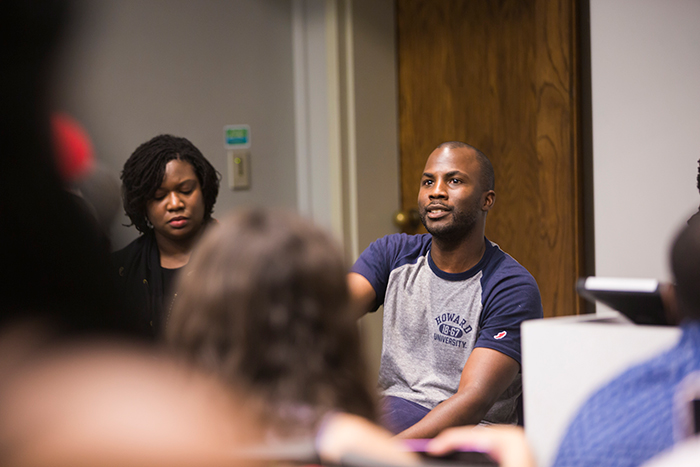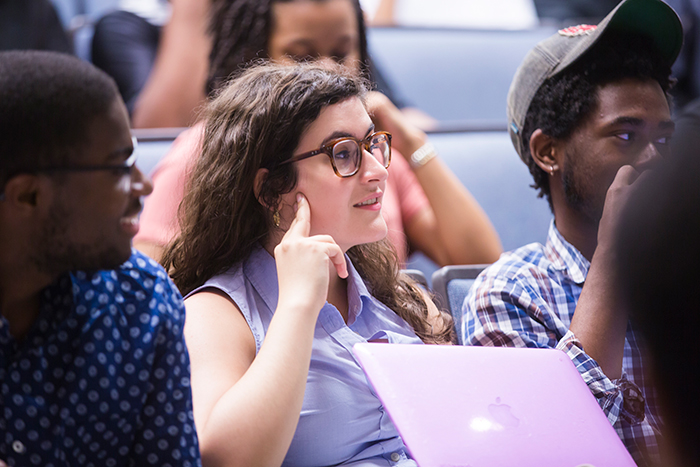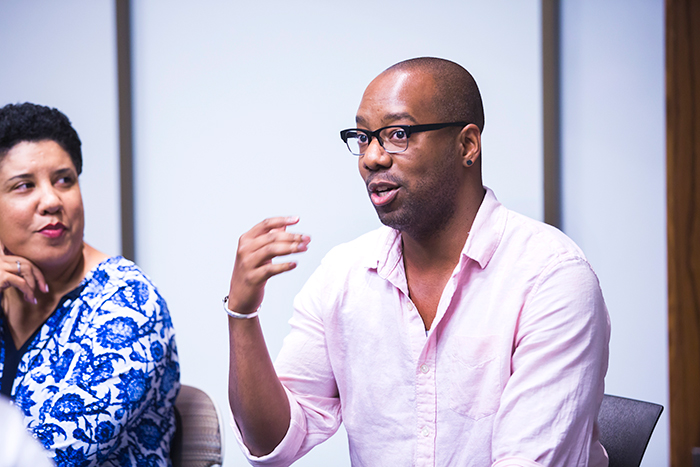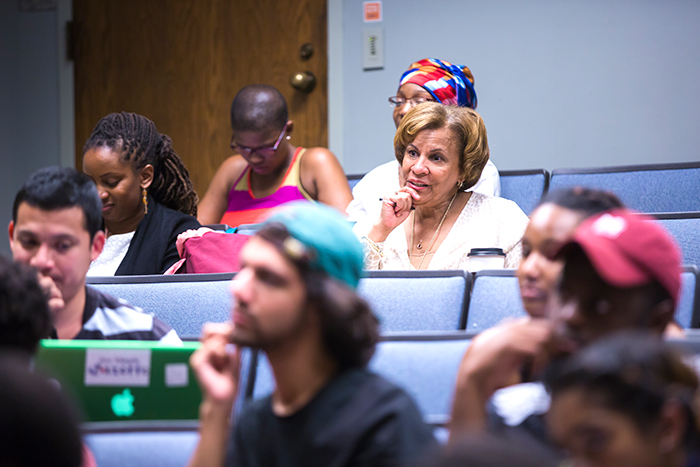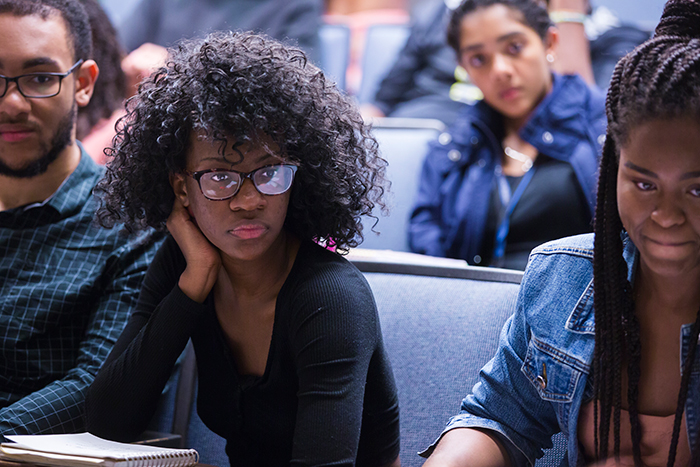How do you grow a professor?
At Emory this summer, undergraduate scholars are finding out how it all begins through the UNCF/Mellon Summer Institute, also known as “academic boot camp” — an immersive four-week program designed to introduce students to life as an academic and sharpen their research skills.
The program also marks the formal point of entry into the Mellon Mays Undergraduate Fellowship Program (MMUF), the centerpiece of the Andrew W. Mellon Foundation’s initiatives intended to increase faculty diversity at colleges and universities.
In June, Emory hosted 31 MMUF fellows from UNCF (United Negro College Fund) institutions across the nation and South Africa, including five rising juniors at Emory College of Arts and Sciences, in a rigorous living and learning environment.
Created by the late Emory professor Rudolph Byrd, the summer institute’s aim is to help grow the number of underrepresented minority scholars — and those dedicated to eradicating racial disparities — within the academy, says Dianne Stewart, associate professor of religious studies, who co-directs the MMUF program at Emory with Carol Anderson, Charles Howard Candler Professor and Chair of African American Studies in Emory College.
Since the MMUF program’s inception in 1988, a total of 716 Mellon Fellows from across the nation have earned PhDs, 106 of whom began their journey at Emory’s summer institute. This fall, 20 MMUF scholars who participated in the summer institute will be enrolled in PhD programs. Emory’s MMUF program alone has produced seven PhD graduates so far.
Yet throughout the academy, the numbers remain strikingly low, Stewart notes.
According to a report by the National Center for Educational Statistics, in fall 2015, among full-time faculty at degree-granting postsecondary institutions, black males and females accounted for about 3 percent each; Hispanic males and females comprised about 2 percent; and American Indian/Alaskan natives made up less than 1 percent.
“Together, the three groups of concern are still under 10 percent,” Stewart says. “But we absolutely know when there are programs that offer mentorship, funding and support to assist students through the process of education, they can fly.”
Academic reality check
The summer institute offers an important reality check for exactly what the path to academic success will entail, Stewart explains.
Mellon fellows attend lectures and seminars on topics such as research design, preparing for graduate school, the art and philosophy of teaching, and achieving professional balance. They also engage in weekly writing critiques, creating a prospectus that forms the foundation for a two-year research project with faculty mentors. The month-long summer program concluded at the end of June with “micro-teaching” sessions for students to present their research, followed by a final banquet, which the students planned and hosted.
“We call it an ‘academic boot camp’ because we’re trying to provide a firm foundation for these students as they begin the first step in their journey of completing their undergraduate degrees as MMUF fellows and going on to graduate school to obtain their PhDs,” says Cynthia Neal Spence, associate professor of sociology at Spelman College and director of the UNCF/Mellon programs.
“We’re so pleased to be able to host a summer institute at Emory,” she adds. “It’s a major research university with wonderful library resources and we’re able to house everyone together, so our fellows know what it’s like to live in a community of scholars.”
By helping forge a supportive intellectual community, the institute nurtures bonds across institutions and disciplines, says historian Leroy Davis, associate professor of African American studies in Emory College and UNCF/Mellon Summer Institute director.
He notes that under Byrd’s early leadership, the UNCF/Mellon Summer Institute became a major component of Emory’s Department of African American Studies research outreach initiatives.
“There is a camaraderie these students will experience this summer that will not be matched by any other organizational affiliation,” he says. “The institute brings everyone together in a safe space to talk about a lot of issues they may not feel as comfortable talking about in other spaces.”
Nurturing a passion for scholarship
When Camila Reed-Guevara arrived at Emory two years ago, she took an introduction to classics course on a whim. It proved to be a game-changer.
“I read ‘The Iliad’ for the first time," she recalls, "and saw all these connections with modern times that I have never really considered before, and thought, ‘This is for me.’”
But becoming a professor?
“I hadn’t thought a lot about academia as a profession,” she says. “But I began to love my major so much that I thought ‘I never want to finish this — I want to read and learn and teach.’”
Serving as a Mellon Fellow at Emory and attending the summer institute opened her eyes to that possibility. “They’ve shown us that it will be a long road, and it’s not for the faint of heart, but I really do believe that education is one of the best ways to change society, and being on the front lines of education is one of the best ways to do that,” she says.
Reed-Guevara especially appreciated a candid roundtable discussion amongst MMUF Fellows — including several Emory graduates — that explored experiences of completing doctoral dissertations, finding academic employment, navigating campus politics, and balancing the demands of personal and professional lives.
“It definitely cemented the idea that this is something you have to be dedicated to,” she says. “But the people who are true heroes in our society are often those who’ve dedicated their lives to something. This is a way to dedicate my life to something that will be valuable.”
And though the summer schedule has been demanding — they’re in classes, seminars or work sessions about six hours a day — Reed-Guevara, who hails from Salt Lake City, Utah, says the time spent on a research prospectus has been invaluable.
“It will become my senior thesis,” she says of her research into how the writings of the Roman philosopher Seneca the Younger inform modern education. In fact, Reed-Guevara now heads to Spain, where she will conduct archival research on the subject — travel funded through the MMUF program. “It’s going to be really helpful to have started my research so early and to have so much writing done,” she says.
Putting dreams within reach
For most of her life, Mawuko Kpodo planned to be a lawyer.
“Even as a child, that’s what I would talk about,” says Kpodo, whose friends call her “Momo.” “It wasn’t until I took my first anthropology class my first semester at Oxford College that I started thinking about what else was out there.
“As far as creating a world better than what I see around me now, I felt I could do more with my time and talents in the academy,” she says. “I still may go to law school, but I love the Mellon program because it understands the value of voices that haven’t been included, which bring a wealth of ideas and knowledge.”
While Kpodo, a native of Ghana whose family lives in Loganville, Georgia, acknowledges the intensity of the summer institute, the Emory MMUF scholar finds something invigorating “about being with a group of peers so passionate about the scholarship they are doing.”
Inspired by a memoir course that she took with Oxford College lecturer Stacy Bell, herself a 1987 Oxford graduate, Kpodo has chosen to research issues of incarcerated women.
Working from philosopher Michel Foucault’s ideas about modern disciplinary societies and their power, she’s now studying the ways social control is made evident in prison and is “tracing the lineage of those forces in larger society.”
“My topic wasn’t as complex when I first came into the program a few weeks ago,” Kpodo laughs. “But now my research has so many different moving parts and theories — but in a good, complicated way.
“Before the program, I would try to imagine myself as an anthropology professor,” she says. “But Mellon has made it real and made it possible, like it’s not a pipe dream. And that’s invaluable.”

